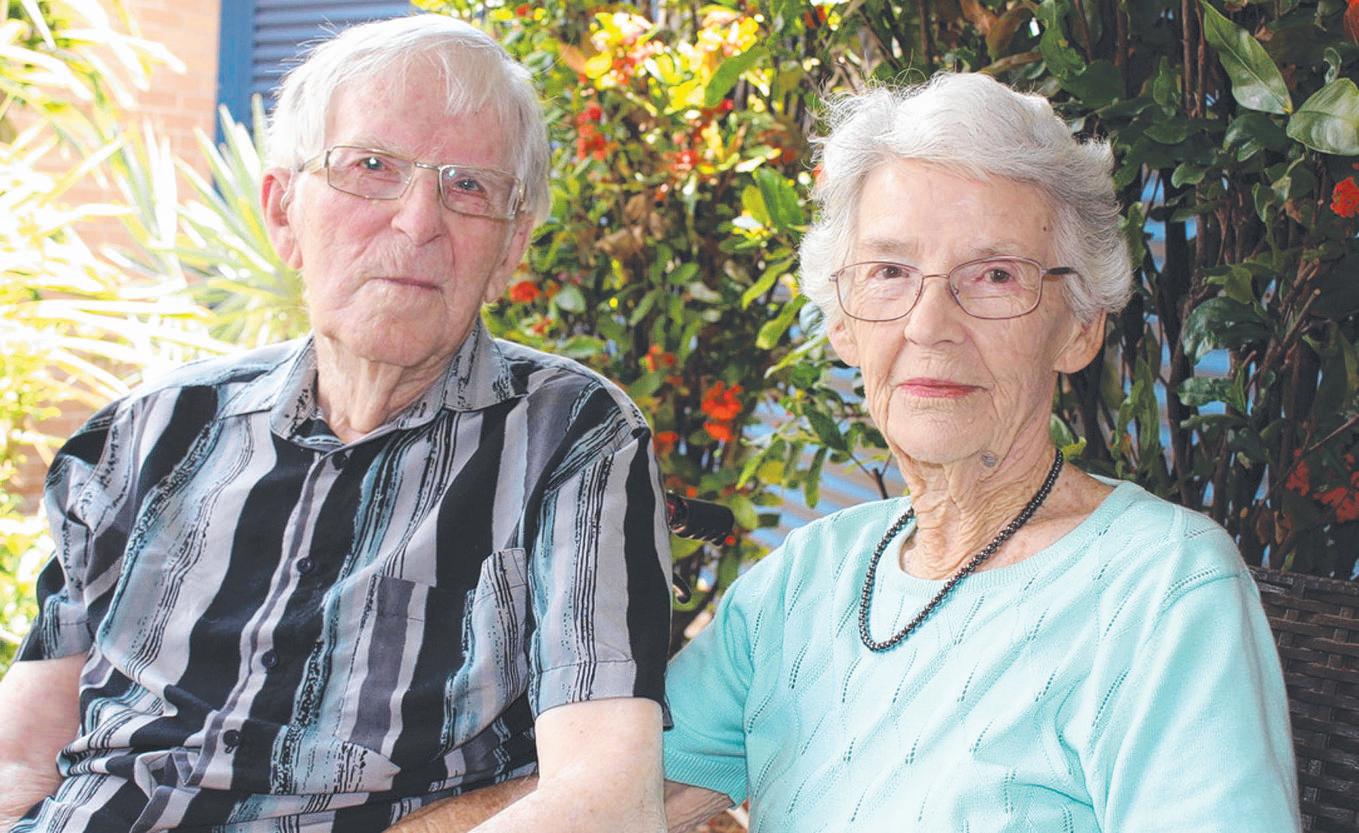
7 minute read
Wellbeing
Look health in the eye SENIORS \\MARCH, 2020 WELLBEING 19
BE WATCHFUL: Glaucoma is a silent disease that develops slowly, experts say. Dementia drink link is targeted crystalline lens of the eye starts to lose its transparency.This condition is dealt with by extraction of the opacified crystalline lens of the eye and replacing it with a clear artificial lens.
Advertisement
• Glaucoma – a condition whereby the optic nerve of the eye progressively becomes damaged. This is often associated with high pressure in the eye. The loss of vision typically occurs in the peripheral sight and often goes undetected. In most cases, this condition can be treated successfully. Unfortunately, glaucoma remains one of the major causes of blindness in the world. This is because the condition has no or very few symptoms in the initial stages and it is probably the most under-diagnosed of serious eye diseases.
• Age-related macular degeneration: This is among the major causes of blindness in Australia. It typically affects central vision. There are two types of age-related macular degeneration: dry and wet. Dry macular degeneration LONG-TERM vision disorders affected 93 per cent of people aged 55 and older in 2017-18, according to the Australian Institute of Health and Welfare’s Eye Health Web Report. Of course, there are many eye conditions that affect people at various stages of life and these often depend on genetic, congenital and lifestyle factors.
According to Daniel Cornelius from Clearly.com.au, the most common to impact ageing Australians are:
• Presbyopia, or “the ageing eye’’, the effects of which we will all experience from the age of about 40 as a normal part of growing older. This condition affects the ability of the eye to change focus from far to near. The onset may vary slightly depending on the lifestyle and environment where people grow up and spend most of their time before the age of 40. • Cataracts: Just like presbyopia, developing cataracts is a normal part of ageing and is not always classified as an eye disease. Cataracts occur when the
Picture: Contributed
EYE-CARE TIPS • Visit you optometrist at least yearly. • Consult your optometrist as soon as you notice a difference in your vision. • Have the right ‘tool’ for the task. In today’s visually demanding world, it makes sense to optimise your vision for specific tasks. • Consider contact lenses as an alternative to wearing your prescription glasses. • Maintain A healthy weight: exercise and diet help prevent diabetes and high blood pressure.
typically progresses very slowly and does not often result in legal blindness. Unfortunately, there are currently no treatments for this condition.
• Diabetic retinal disease: There has been a dramatic increase in type 2 diabetes among the ageing population of the world, leading to a radical increase in diabetic retinopathy. The risk of developing these retinal complications greatly increase with undiagnosed type 2 diabetes or poorly controlled type 2 diabetes. Managing the risk for related eye disease requires a multidisciplinary approach, with regular screening for retinal disease recommended.
CLARIFYING the relationship between alcohol use and dementia is just one of 19 new projects that will share in $1.5 million in grants to conduct groundbreaking dementia research.
Dr Louise Mewton from UNSW Sydney’s Centre for Healthy Brain Ageing (CHeBA) was awarded a $75,000 Dementia Australia Research Foundation Pilot Grant, sponsored by the Dementia Centre for Research Collaboration, and will use the funding to clarify the relationship between low to moderate alcohol use and the risk of dementia. “This world-first study combines innovative, stateof the-art research methods to address two of the largest contributors to the global disease burden: dementia and alcohol use,” she said. “To date, the relationships between these two key causes of death and Wellbeing V1 - SENE01Z01MA
disability have been underresearched and overlooked. It is critical that we have a better understanding of how alcohol use is related to agerelated diseases such as dementia.
“This research will uncover innovative avenues for dementia prevention through the development of age-appropriate, evidencebased recommendations on the number of standard drinks per week associated with minimal dementia risk.” The chair of the Dementia Australia Research Foundation, Professor Graeme Samuel (AC), said the grants provided support to early and mid-career researchers who wanted to make a difference in the field of dementia.
“This next generation of talented researchers will be among those tackling some of the biggest challenges in this field. These grants CRUCIAL LINK: New research is looking into how alcohol use relates to dementia.

provide vital insights into reducing dementia risk, improving accurate and timely diagnoses and establishing treatment and care options for people who live with dementia,” he said. “With the number of people living with dementia expected to increase to almost 1.1 million by 2058, research into dementia is now more urgent than ever. “Further, the broad range of projects supported, including nanotechnology, hip-fracture prevention, enhancing cognition with
Picture: Contributed
exercise and personalising care through music, reflect the increased diversity and quality of research in the dementia space across Australia.’’
20 WELLBEING Quality of Ted’s life lifts with top care

BRAND INSIGHTS
IN DECEMBER, Edgar (Ted) and Jean King celebrated a rare but wonderful occasion: their 70th wedding anniversary.
“It’s been a good 70 years, hasn’t it, darling?” Jean smiles, patting Ted’s arm.
His response says more than words as he returns her smile.
Yet there was a time when Jean feared they wouldn’t be here.
“Three years ago, we were all booked to go to New Zealand. Ted had a pain in his chest,’’ Jean said.
“The doctors suggested an angiogram instead. “Ted had a heart bypass years and years ago, and it had been absolutely marvellous.
“This time he got a stent, and it disturbed something and caused a massive stroke. “The doctors said he would never do anything again.”
Ted and Jean moved to Alstonville 10 years ago to be closer to their son, Ian, the Ballina vet.
For Ted’s ongoing care needs, BaptistCare Maranoa, Alstonville, seemed the obvious preference.
“I live just two kilometres from here. Had he not been as close, I wouldn’t have been able to visit him as I do,” Jean said.
Despite the tumultuous time, Jean and Ted felt at home right away.
“The staff are marvellous. They’ve been so good to him, and to me. I’m Jean and he’s Ted, we just belong here.”
Ted is walking with help from his physiotherapist, communicating without talking, and smiling often. “It gives me every comfort to know he’s so well cared for,’’ Jean said.
“I leave each afternoon ENDURING PARTNERSHIP: In December 2019, residents of BaptistCare Maranoa, Alstonville, Edgar (Ted) and Jean King, celebrated their 70th wedding anniversary.
The Kings on their wedding day in 1949.
knowing he will be well looked after.”
While every journey into residential care is as unique as you are, BaptistCare helps you navigate and understand the options available to you or your

loved one. Finally, people are offered aged care advice made simple.
For more information, go to baptistcare.org.au/aged care or phone 1300 275 227 to speak to our Aged Care Support Team.
Call for better testing of those at viral risk

NATIONAL Seniors has come out in support of the strong stance being taken by health departments and others on the threats of COVID-19. The organisation is concerned that a person already identifiable as vulnerable should not have been exposed to the virus in an environment where prevention was possible. “Isolation is too late a measure for people at risk and the risk should be stopped at the first points of access or contact,’’ it said.
“Testing of staff needs to be fully implemented so that this doesn’t occur again. “Staff should not be penalised because they test positive and, particularly, it should not affect their wages and conditions.’’
National Seniors said any vulnerable person living in Australia, whether 95 or five years of age, deserved the fullest protection available. COVID-19 versus influenza
National Seniors cited epidemiologist Tom Duszynksi, writing in The Conversation, as saying the coronavirus isn’t a rare “black swan” event but a product of evolution. He says there have been about 40 new, infectious diseases discovered globally since the 1970s, with pathogens often jumping from animals to humans.
COVID-19 produces signs and symptoms that are similar to influenza, which makes it difficult to distinguish between the two. COVID-19 can cause fever, cough, body aches, fatigue and, occasionally, vomiting and diarrhoea; both can cause pneumonia as well.
“Also, COVID-19 is more contagious than seasonal influenza. The average person, even with mild symptoms, is likely to spread the disease to more than two people. By contrast, the seasonal flu’s rate is roughly half.’’
Be flu vaccinated Getting the vaccine for the seasonal flu could be helpful for you and for medical professionals, National Seniors said. “Since the signs and symptoms are similar, if everyone were to be vaccinated against the flu, fewer people would have the flu, thus making it easier to detect another disease with similar symptoms.
“The faster COVID-19 is identified, the faster public health and the medical community can respond to minimise its spread.’’




